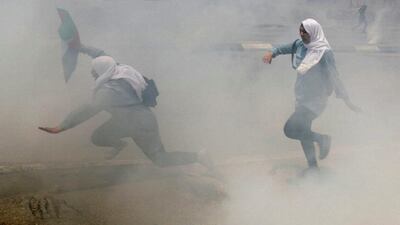RAMALLAH // Palestinians marching to remember those displaced during the creation of Israel clashed with Israeli forces in the occupied West Bank on Monday, leaving several wounded.
This year marked the 69th anniversary of the “nakba” or catastrophe, during which around 700,000 Palestinians were expelled from their land, or fled out of fear.
At a checkpoint on the outskirts of Ramallah, dozens of Palestinian youths hurled rocks at Israeli soldiers, who responded with rubber bullets and the foul-smelling riot control spray known as skunk.
A Palestinian emergency worker said 11 Palestinians were taken to hospital, most of them wounded by rubber bullets. The extent of their injuries was not known.
Earlier, thousands of people carrying Palestinian flags had marched through the city, many carrying large keys to symbolise their claims to the homes they lost in 1948.
“I come every year to commemorate this anniversary, this catastrophe,” said Salha Orabi, a descendant of refugees and now a resident of the nearby Jelazoun refugee camp.
“The nakba for us symbolises destruction ... It is us who have left our homes and our land.”
In Bethlehem, hundreds of Palestinians threw stones at Israeli troops guarding the tomb of biblical matriarch Rachel, a shrine venerated by both Jews and Muslims.
Soldiers fired tear gas and stun grenades, but the number of Palestinian casualties was not immediately known.
For the Palestinians, the right to return to homes they fled or were forced to leave is a prerequisite for any peace agreement with Israel, but it is a demand that Israel has rejected.
This year’s anniversary came against the backdrop of a hunger strike by Palestinians in Israeli prisons, led by jailed leader Marwan Barghouti.
In a message from his solitary confinement cell, Barghouti said the strike, which entered its 29th day on Monday, would go on indefinitely.
“My oath and pledge to the prisoners and our people is to pursue the battle for freedom and dignity until it reaches its stated goals,” he said.
Off the northern Gaza Strip on Monday, a Palestinian man was killed when an Israeli patrol boat fired at a group of fishermen.
Under Israel’s 10-year-long blockade on Hamas-run Gaza, fishing off the northern part of the Palestinian territory is limited to six nautical miles offshore and the Israeli navy regularly fires at Palestinians at the zone’s outer limit.
Such incidents rarely result in deaths, however.
Fishermen’s union head Nizar Ayash said the deadly shooting and the arrest of four other crewmen happened in one incident and that two more arrests were made when the military boarded another Gaza boat overnight.
The dead man’s family identified him as Mohammed Majed Bakr, 25.
“A vessel deviated from the designated fishing zone in the northern Gaza Strip,” said an Israeli military spokeswoman. “Naval forces in the area called upon the vessel to halt and fired warning shots into the air.”
She said the boat ignored the warning and the navy then fired at it.
UN officials have called for the blockade to be lifted, citing deteriorating humanitarian conditions, but Israel says it is needed to keep Hamas, which runs the strip, from importing weapons or materials used to make them.
The size of the fishing zone has varied over the years, having been set at 20 nautical miles by the Oslo accords of the 1990s before being reduced by Israeli authorities.
About 4,000 fishermen work off the coastal strip, more than half of whom live below the poverty line.
Also on Monday, the US’s new – and controversial – Israeli ambassador, David Friedman, arrived in Israel to take up his post, days ahead of a visit by US president Donald Trump.
Mr Friedman has been a strong supporter of Israeli settlement building in the occupied West Bank.
He has also advocated breaking with decades of precedent and moving the US embassy from Tel Aviv to Jerusalem, a prospect deeply alarming to Palestinians.
* Agence France-Presse

